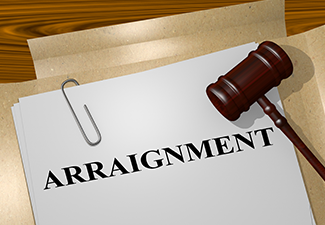What Will Happen at the Arraignment?
Sept. 26, 2023
 The arraignment hearing is one of the most important and misunderstood phases of the criminal process. If you are facing criminal charges, the arraignment will be your first formal appearance before a judge. The hearing also marks the beginning of the courtroom process in your criminal case.
The arraignment hearing is one of the most important and misunderstood phases of the criminal process. If you are facing criminal charges, the arraignment will be your first formal appearance before a judge. The hearing also marks the beginning of the courtroom process in your criminal case.
When charged with a crime, it is crucial that you understand what happens at the arraignment and what you can do during the hearing to improve your chances of receiving a favorable outcome. If this sounds like your situation, I can help. As a criminal defense attorney at Walker Law LLC, I can help you navigate the criminal justice system in Missouri and prepare the best strategy for your case. My law offices are based in Chesterfield, Missouri, and Town and Country, but I also provide strong legal counsel to people accused of crimes throughout St. Louis County and Charles County.
What Is an Arraignment?
An arraignment is a formal hearing in open court in which the defendant is formally read the charges they are facing and asked how they plead. The date when the arraignment is held varies from one case to another. However, the law requires that the defendant must be arraigned within a reasonable amount of time after their arrest date.
What Happens at the Arraignment?
The arraignment hearing begins with the judge reading the charges against the defendant and informing him or her of their rights. The defendant is also typically provided a summary of the alleged facts in their criminal case. Then, the defendant is asked how they wish to plead in their case. The defendant can plead guilty, not guilty, or no contest.
The judge also establishes bail or release conditions during the hearing. When setting the conditions of release, the court will generally consider a wide range of factors, including the defendant’s:
criminal history;
ties to the community;
Employment;
history of non-appearance in court; and,
the level of threat posed to the safety of the community.
Courts commonly set the following conditions of release during the arraignment hearing:
bail bond
supervised release
prohibition on contacting the victim
prohibition on leaving the county, state, or country
prohibition on possessing firearms
prohibition on using drugs or alcohol
As long as the defendant follows the conditions that have been set, they may stay in the community. A violation of these conditions can result in the defendant’s arrest. You might want to have a skilled criminal defense attorney on your side when the judge sets the conditions of release in your case so that the conditions are less restrictive. Your attorney will fight for your best interests to ensure that the conditions are not harsher than necessary.
Understanding Your Plea Options at the Arraignment
One of the most crucial parts of the arraignment hearing is when the judge asks the defendant how they plead. How you plead will determine what happens next in your criminal case. You have the following plea options to choose from:
Guilty. When you plead guilty, you accept the charges and allegations against you. If you choose a guilty plea, your case will proceed to sentencing where the judge will decide which punishment is most appropriate.
Not guilty. By pleading not guilty, you are saying that you did not commit the crime you are accused of and wish to contest the charges and allegations against you. After pleading not guilty, your case will proceed to a trial.
No contest. When you plead no contest, you accept the facts of the case but do not admit your guilt. After you enter a plea of no contest, your case will proceed to sentencing.
Consider consulting with an attorney before the arraignment hearing takes place to discuss your plea options. At Walker Law LLC, I can help you make an informed decision about whether to take a plea or go to trial.
Should I Hire an Attorney for the Arraignment Process?
While you can represent yourself during the arraignment process, it is advisable that you have an attorney on your side when the hearing takes place. Presenting your case in front of the judge can be a scary and nerve-wracking experience, especially if it is your first time facing criminal charges.
You may not know what to say and what to avoid saying during the arraignment hearing, which is why having legal counsel is important. Your attorney will provide you with the guidance you need, help you prepare for your court appearance well in advance, and will work tirelessly to argue for favorable conditions of release in your case.
Understand Your Next Steps
As a criminal defense attorney at Walker Law LLC, I am dedicated to defending the rights of people facing various criminal charges in Chesterfield, Town and Country, and other parts of St. Louis County and Charles County. I can help you navigate the criminal justice system and ensure that your rights are respected at every step of the process, including the arraignment. Contact my office to schedule a free consultation and get started today.
